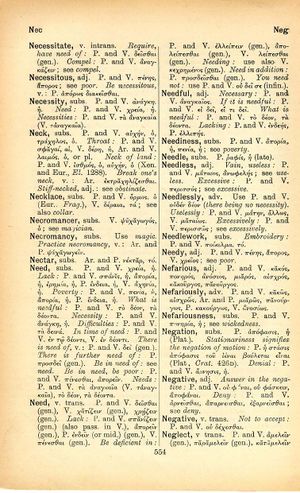negative: Difference between revisions
From LSJ
Περὶ τῶν Ἱπποκράτους καὶ Πλάτωνος δογμάτων → On the Doctrines of Hippocrates and Plato
(3) |
m (Text replacement - "(|thumb)\n(\|link=)" to "$1$2") |
||
| Line 1: | Line 1: | ||
{{Woodhouse1 | {{Woodhouse1 | ||
|Text=[[File:woodhouse_554.jpg|thumb | |Text=[[File:woodhouse_554.jpg|thumb|link={{filepath:woodhouse_554.jpg}}]]'''adj.''' | ||
|link={{filepath:woodhouse_554.jpg}}]]'''adj.''' | |||
<b class="b2">Answer in the negative</b>: P. and V. οὐ φάναι, οὐ φάσκειν, ἀποφάναι. | <b class="b2">Answer in the negative</b>: P. and V. οὐ φάναι, οὐ φάσκειν, ἀποφάναι. | ||
<b class="b2">Deny</b>: P. and V. ἀρνεῖσθαι, ἀπαρνεῖσθαι, ἐξαρνεῖσθαι; see [[deny]]. | <b class="b2">Deny</b>: P. and V. ἀρνεῖσθαι, ἀπαρνεῖσθαι, ἐξαρνεῖσθαι; see [[deny]]. | ||
Revision as of 17:36, 18 May 2020
English > Greek (Woodhouse)
adj.
Answer in the negative: P. and V. οὐ φάναι, οὐ φάσκειν, ἀποφάναι. Deny: P. and V. ἀρνεῖσθαι, ἀπαρνεῖσθαι, ἐξαρνεῖσθαι; see deny. v. trans. Not to accept: P. and V. οὐ δέχεσθαι.
Latin > French (Gaffiot 2016)
nĕgātīvē, (negativus) négativement : Cassiod. Lib. litt. De rhet. arg. 3 ; Boet. Top. Cic. 5.
Latin > German (Georges)
negātīvē, Adv. (negativus), verneinend (Ggstz. affirmative), Cassiod. de dialect. p. 548 (a) ed. Garet. Boëth. in Cic. top. lib. 5. p. 359, 9 B.
Latin > English
negative ADV :: negatively; in the negative (Souter)

